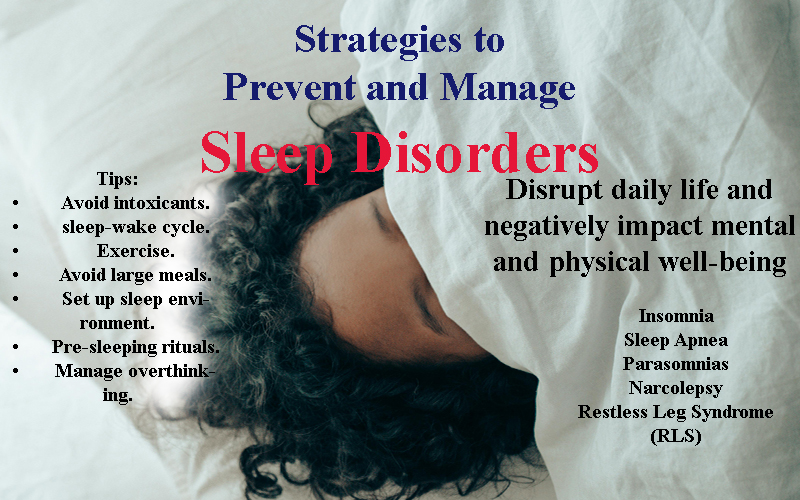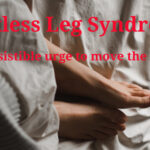How to prevent and manage sleep disorders? While sleep disorders can occur due to a sudden change in life, keeping a regulated set of habits can help maintain an optimal sleeping habit.


Sleep disorders can disrupt daily life and negatively impact mental and physical well-being. Establishing consistent habits is crucial to maintaining optimal sleep. To prevent sleep disorders and maintain optimal sleep habits, it’s important to follow a regulated set of habits. Here are some tips:
Insomnia:
Causes: Jet lag, stress, anxiety, hormones, digestive issues.
Symptoms: Difficulty falling asleep, restless sleep, feeling unrested, waking up early.
Prevention: Maintain a regular sleep-wake cycle, avoid stimulants like caffeine and nicotine before bedtime, create a comfortable sleep environment, and develop pre-sleeping rituals.
Sleep Apnea:
Types: Obstructive Sleep Apnea (OSA) and Central Sleep Apnea (CSA).
Symptoms: Breathing pauses, snoring, daytime sleepiness, difficulty concentrating.
Prevention: Maintain a healthy weight, avoid alcohol and sedatives, use a continuous positive airway pressure (CPAP) machine if prescribed.
Parasomnias:
Examples: Sleepwalking, talking, nightmares, teeth grinding.
Prevention: Create a calm sleep environment, manage stress, and consider seeking professional help if needed.
Narcolepsy:
Symptoms: Sudden sleep attacks, excessive daytime sleepiness.
Prevention: Establish a consistent sleep schedule, take short naps if needed, and seek medical advice for proper management.
Restless Leg Syndrome (RLS):
Symptoms: Uncontrollable urge to move legs, especially during rest.
Prevention: Identify and address underlying medical conditions, maintain good sleep hygiene, and consider lifestyle changes.
General Tips to Prevent Sleep Disorders:
Avoid intake of stimulants (caffeine, alcohol, nicotine) before bedtime.
Maintain a regular sleep-wake cycle.
Avoid exercise close to bedtime.
Don’t eat large meals before bedtime.
Avoid napping late in the day.
Create an optimal sleep environment (dark, quiet, comfortable temperature).
Develop pre-sleeping rituals.
Manage overthinking with activities like journaling or creating a to-do list.
FAQs:
Psychological Effects of Sleep Deprivation:
Confusion, exhaustion, lack of energy.
Worsening of mood disorders (depression, anxiety, aggression).
Impaired cognitive function and focus.
Gender and Sleep Disorders:
Females are more affected than males, leading to decreased concentration due to tiredness or sleepiness.
When to Consult a Physician:
If daily activities are affected by lack of sleep.
If changes in behavioral patterns show no improvement.
Foods for Better Sleep:
While studies are not conclusive, some foods may help with sleep.
Examples: Kiwi, almonds, chamomile tea, tart cherry juice, and dairy products.
It’s essential to consult a healthcare professional for personalized advice if you experience persistent sleep issues.
Dr. Chalapathy
Vydehi Super Specialty Hospital (VSH), Vittal
Mallya Road, Ashok Nagar, Bengaluru 500001
Ph: 080-22277979/9148972991
Vydehi Institute of Medical
Sciences & RC, White field, Bangalore – 560066
ph : +91-80-4906 9000 Extn:1147/1366 www.vims.ac.in











